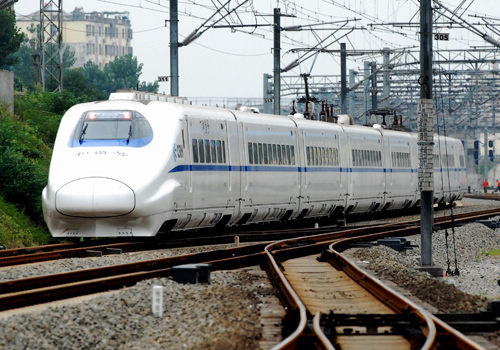|
 |
|
CHOOSE A WAY: A bullet train runs through the Jiujiang section of the Nanchang-Jiujiang Railway. China is to decide the direction for the railway reform (HU GUOLIN) |
Former Minister of Railways Liu Zhijun is still facing criminal procedures for corruption, and the shadow of the high-speed train accident that killed and hurt more than 300 people in July last year has not yet disappeared. These two events drove calls by the Chinese public to reform the railway sector. On March 22, the State Council approved a reform plan for 2012 formulated by the National Development and Reform Commission (NDRC), which says that the government is researching a reform plan for the railway sector and that the Ministry of Railways (MOR) and the NDRC are responsible for the plan.
This means that China will restart the railway reform. Industry insiders say the reform will allow access of foreign and private capital to the construction and business operation of railways.
Since the People's Republic of China was founded in 1949, the development of the railway sector has featured a state monopoly and powerful expansion. However, problems arising with monopolies, such as lack of responsibility, low efficiency and corruption, have also greatly damaged the further development of the railway sector and the safety of the transportation system, which invited continuous domestic calls for breaking the monopoly and reforming the railway industry. In 1986, 2000 and 2005, China tried three times to reform the railway sector, but failed to carry through the reforms for various reasons.
Since there is no detailed scheme, the market has to guess at the details of the reform, but it has been confirmed that "private capital will be encouraged to enter the railway sector." The executive meeting of the State Council held on March 21 made sure to "encourage private capital to participate in transportation construction" and required to "complete some key railway projects and start at appropriate time some urgent and necessary projects." This indicates that diversified operation will become the breakthrough point of the railway sector's market-oriented reform.
Separating government administration from enterprise management will guarantee entry of private enterprises. Sheng Guangzu, Minister of Railways, said at the national railway work conference held in December last year that after separation of government administration from enterprise management, the MOR would only perform functions of government supervision, represent state assets investment and administer the industry. Other powers and responsibilities will be distributed to local railway bureaus, which will be the major market participants.
Hu Siji, professor at the School of Traffic and Transportation of Beijing Jiaotong University, said a mixture of government administration and enterprise management is the crucial cause of the problems bothering the Chinese railway industry. Such a mechanism has blocked the railway sector from introducing market competition mechanisms. Without breaking such a mechanism, it will be impossible to introduce market competition.
A mixture of government administration and enterprise management also leads to uncontrolled internal management of the railway sector. A major reason for the frequent corruption cases in the railway sector in recent years is the excessive concentration of power. "The railway mechanism must be reformed. Otherwise the existing problems are hard to solve, and the first thing to reform is to break the mixture of government administration and enterprise management," Hu said.
| 